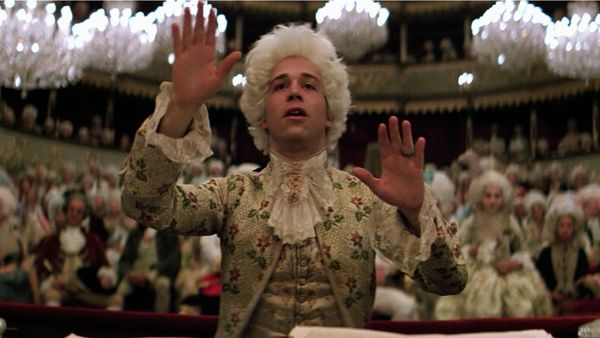Eye For Film >> Movies >> Amadeus - The Director's Cut (1984) Film Review
Amadeus - The Director's Cut
Reviewed by: Keith Hennessey Brown

After a failed suicide attempt, the aged and forgotten composer Salieri must see the confessor. Realising the young priest has no idea who he is, that he was once composer to the Emperor Joseph II, but recognises the Mozart piece he plays, Salieri proceeds to tell the priest how he brought about Mozart's downfall in order to spite God.
While Mozart's father encouraged - and exploited - his son's musical genius, Salieri's father showed scant interest in his son's musical aspirations.

Interpreting his father's death as divine providence, the young Salieri resolved to devote his life to glorfying God through his music.
Hearing divine inspiration in Mozart's music, Salieri questions why the impious Mozart has been rewarded and he - "a good man" - rejected. Then, after Mozart has not only insulted him socially and musically but also taken his mistress, Salieri resolves to destroy the man he regards as God's composer.
Amadeus is a damn fine film. Milos Foreman's direction is assured without being showy, Peter Schaffer's adaptation of his own play for the screen sharply written and fully aware of the possibilities of the medium. The performances vary between the good and the great, with F Murray Abraham utterly brilliant as the cynical, bitter, Iago-like Salieri. The production design and costuming are attractive and full of period detail. Last, but certainly not least, the music is simply sublime.
All these elements come together as spectacular cinema. The effect of placing opera, music, theatre and more under the over-arching roof of cinema is not so much Mozartian as Wagnerian - Amadeus is perhaps the closest popular cinema has got to the unattainable ideal of the "total art work".
The only flaw, as far as I am concerned, is the way Amadeus presents its titular character. He remains unknowable, his genius inexplicable. Perhaps this is the point, but if so it's a somewhat facile one. Elsewhere, Schaffer remarks that Mozart "had a very canny sense of reality". Alas, it doesn't come across on screen. Here Mozart is utterly naive, insensitive and largely devoid of commonsense.
But if one takes the film as a superb piece of cinema in which historical veracity and character psychology are always going to be subordinate to the needs of compelling drama, this doesn't matter.
Bravo.
Reviewed on: 14 Oct 2002



















